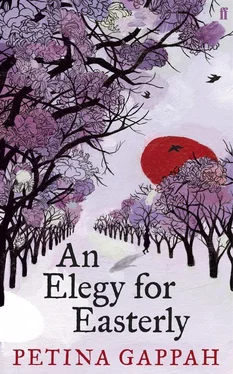Petina Gappah - An Elegy for Easterly
Здесь есть возможность читать онлайн «Petina Gappah - An Elegy for Easterly» весь текст электронной книги совершенно бесплатно (целиком полную версию без сокращений). В некоторых случаях можно слушать аудио, скачать через торрент в формате fb2 и присутствует краткое содержание. Год выпуска: 2009, Издательство: Faber & Faber, Жанр: Современная проза, на английском языке. Описание произведения, (предисловие) а так же отзывы посетителей доступны на портале библиотеки ЛибКат.
- Название:An Elegy for Easterly
- Автор:
- Издательство:Faber & Faber
- Жанр:
- Год:2009
- ISBN:нет данных
- Рейтинг книги:4 / 5. Голосов: 1
-
Избранное:Добавить в избранное
- Отзывы:
-
Ваша оценка:
- 80
- 1
- 2
- 3
- 4
- 5
An Elegy for Easterly: краткое содержание, описание и аннотация
Предлагаем к чтению аннотацию, описание, краткое содержание или предисловие (зависит от того, что написал сам автор книги «An Elegy for Easterly»). Если вы не нашли необходимую информацию о книге — напишите в комментариях, мы постараемся отыскать её.
An Elegy for Easterly — читать онлайн бесплатно полную книгу (весь текст) целиком
Ниже представлен текст книги, разбитый по страницам. Система сохранения места последней прочитанной страницы, позволяет с удобством читать онлайн бесплатно книгу «An Elegy for Easterly», без необходимости каждый раз заново искать на чём Вы остановились. Поставьте закладку, и сможете в любой момент перейти на страницу, на которой закончили чтение.
Интервал:
Закладка:
The only time he said anything of any length was at the beginning and the end of each term when he sat us down, Rambanai, Thomas, my brother Godi and me, and gave us all a lecture; it was always the same lecture. In his deep slow voice, he called us by name, one by one from the eldest to the youngest.
‘Godfrey. Thomas. Matilda. And you, Rambanai. You must understand, children,’ he said, ‘the value of education. Every parent hopes that his children will be better off than he was. Every parent looks to education to achieve that hope. Remember, children, the value of education.’
This was the speech he gave, and nothing beyond this, so that when I saw him lying in his coffin during the body viewing on the night that he spent atop the coffee table in the living room, it seemed as though in just a matter of minutes he would raise himself to talk about education before sinking back into his usual silence.
Still, he was Rambanai’s father, and I expected that she would be grieved at his passing; a father was a father, after all, even one as unsmiling as Ba’muniniBa ’Thomas. I did not expect, however, that she would send wails across Immigration and Customs as soon as she saw us. We looked down at her from the observation platform at the airport, with my parents, my aunt and small cousin-brothers we saw her disembark from the aeroplane, cast her face towards us and break into a loud keening that startled the cluster of white visitors waiting in line immediately in front of her. She wept so loudly in the long, slow queue to get her passport stamped that one of the government officials ended up taking her by the arm and fast-tracking her away from the tourists.
In the kitchen, our housemaid Sisi Dessy whispered to VateteMai Mazvita that Rambanai looked just like her idea of someone who had come from overseas. Having been in America for five years without coming home, she was the star at the funeral; everyone wanted to look at her. She would have given the mourners much to talk about, but she gave them more than they needed. She put her hands to her head. She made as though to jump into the grave. She cried out for her father in a voice hoarse with weeping.
‘We all know how hard it is to lose a father, handiti ,’ VateteMai Mazvita said, ‘but surely, this is too much, munhu unochemavoka zvine yeyo . Where have you seen a daughter weeping more than the wife?’
At my uncle’s funeral, a special eye was kept on his widow, both to give comfort — and for fear that she might do herself harm. The consensus at my uncle’s funeral was that a particularly vigilant eye should also be kept on the daughter, so a younger aunt and I were given the duty of staying with her. In the middle of the night of the day that we buried my uncle, I woke to the sound of a commotion. I looked on the bed and got up when I saw the depressed space where Rambanai’s body should have been. I followed the voices outside. I found Rambanai standing in a knot with other women. Their eyes were on my uncle’s widow. Two women held her arms as she wailed with her face to the heavens, the Zambia cotton wrapper that was normally tucked securely around her waist folded into a thick rope around her neck. ‘I will do it, leave me be. There is no reason now for me to live,’ she cried. ‘ Waenda waenda, waenda murume wangu waenda .’
‘She tried to hang herself off that tree there,’ Rambanai said to me as I joined her. She pointed at a peach tree with long thin branches barely able to support the weight of its own fruit.
My aunt was persuaded to go back inside, and after this excessive, if belated, outpouring of grief wept only when the new mourners arrived. Nor did Rambanai equal her own performance at the grave-side. It was only later that I understood that Rambanai had been in mourning not only for her father, but also for the death of her American dream.

After the funeral, Rambanai stayed a week, three weeks, one month, five months, eleven. She stayed so long that the question, vakadii veku States, moved from vachadzokera riiniko veku States to kuti vachadzokera veku States. ‘Should not your cousin-sister have gone back to Dallas by now?’ my boyfriend Jimmy asked me. ‘If she stays any longer, she will be here for the kurova guva ceremony,’ he added, referring to the ceremony that was performed exactly a year after a person’s death. I did not answer; I was too busy laughing and trying to stop him from taking my bra off as he drove.
In the eleven months that followed Ba’muniniBa ’Thomas’s funeral, Rambanai always seemed to be on the verge of departure. She shopped for the many friends she had left behind in America, packed her suitcase, and did the rounds to say her goodbyes. But to hear her tell it, the fates had other plans. Just when she had packed and said her goodbyes, just when we thought now was the moment to take her to the airport, she would tell us about another mix-up with her visa, or a ticketing problem that involved Delta, Air Zimbabwe and American Airways.
‘I have confirmed my onward connection from Atlanta to Dallas,’ Rambanai said. ‘The flight from Jo’burg to Atlanta is sorted. The problem is really with AirZim. From now on, I will only fly SA.’
‘Rambanai needs to take three aeroplanes just to get to America,’ I heard VateteMai Mazvita explain to our housemaid Sisi Dessy, and Sisi Dessy burnt the meat, I suspect because she got carried away by her contemplation of a journey so long. And when Jimmy said he knew someone who worked at Air Zimbabwe, Rambanai gave a small, tight smile and talked about Dallas.
Rambanai stayed with me and my parents in Mabelreign. ‘She wants to stay with her age-mate,’ her stepmother said, referring to me, but we knew that she and her stepmother had only talked because of Ba’muniniBa ’Thomas, and now that he was gone, not even her half-brothers could induce her to spend any time at their home in Mount Pleasant.
We spent the days when I was not at work walking around Harare where Rambanai delighted at the most common sights. ‘I want to ride in an emergency taxi,’ she said, ‘let’s take ETs everywhere.’ I went along with her even though I preferred to wait for Jimmy to drive me wherever I needed to go. We followed the rituals attendant to riding in ETs, the emergency taxis that were the only reliable form of transport for Harare’s commuters. In obedience to the conductors’ hectoring commands garisanai four four and ngatibatanidzei tione vabereki nevaberekesi , we sat buttock to buttock, sixteen people in minibuses that said ‘Maximum Passengers: 12’. We collected the ET fares from the passengers behind us, passed them to the passengers in front of us, who passed the money to the passengers in front of them until all the money reached the conductor. Through it all, Rambanai chatted with the drivers and the conductors and anyone else who would listen.
‘The public transport is very different in the States, where I live,’ she said. I wanted to sink into my seat, her voice was so loud, but the driver whistled, lowered his volume, and announced to everyone in the car, ‘ Ava sister lives in the States.’ The people looked at us and a woman with a small child made him sit on her lap so that we could have more space.
With Rambanai, I saw Harare anew. Our feet crushed the fallen jacaranda blooms in Africa Unity Square as hawkers cajoled us to buy their wares. We saw the men at the flower market outside the Meikles Hotel who cried out and tried to persuade random passing men to buy random passing women flowers. We giggled like schoolgirls at the photographers who made people strike old-fashioned poses on the grass of Harare City Gardens. When Rambanai wanted her hair braided, instead of going to Mane Attraction or Nice and Easy or Afro Chic like a normal person, she chose to get her hair done in Mbare township. We spent the day with Rambanai seated on a Zambia wrapper spread on the ground as a woman called Manyara braided her hair, while three other women finished off the ends as Manyara told us about all the government ministers she had slept with in the days she was a prostitute.
Читать дальшеИнтервал:
Закладка:
Похожие книги на «An Elegy for Easterly»
Представляем Вашему вниманию похожие книги на «An Elegy for Easterly» списком для выбора. Мы отобрали схожую по названию и смыслу литературу в надежде предоставить читателям больше вариантов отыскать новые, интересные, ещё непрочитанные произведения.
Обсуждение, отзывы о книге «An Elegy for Easterly» и просто собственные мнения читателей. Оставьте ваши комментарии, напишите, что Вы думаете о произведении, его смысле или главных героях. Укажите что конкретно понравилось, а что нет, и почему Вы так считаете.












